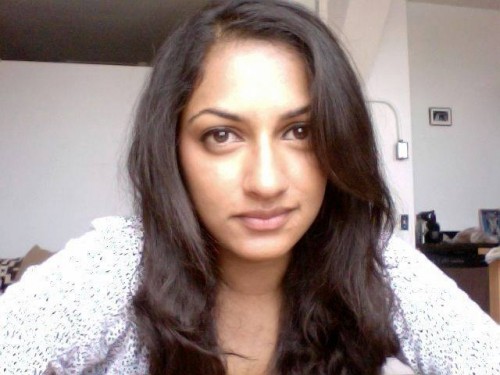
Alumni Spotlight: Reema Amin
Sometimes you end up on a different path from where you started.
For Columbia College Chicago Journalism MA alum, Reema Amin, that was the case.
Although Amin, 24, said she secretly wanted to be a chef or an actress, she started her collegiate career studying law at the University of Illinois.
Thinking it would help her be concise moving forward in her law degree, Amin said she took journalism classes. But the more journalism classes she took, the more she realized by her sophomore year that was the major she’d rather pursue.
“I just want to write and uncover things that people don’t know about,” Amin said. “And that’s what I wanted to do, and I didn’t think a career in law would really fulfill my constant curiosity.”
From there she worked even harder towards her journalism degree. She wrote for the student paper, The Daily Illini, and ended up covering the transportation beat.
Although the program at Illinois was strong and Amin said she thought she could’ve found a job after graduation, she said she wanted to experience journalism on a bigger level, in a large market.
So Columbia College Chicago became her next step.
“I still had so much to learn,” Amin said. “And knowing what I know now, I would’ve not been ready [for the real world].”
She said the biggest strength of Columbia’s Journalism, MA program was pushing the students out into the field and taking advantage of Chicago City Council and other weekly public meetings, which serve as great learning tools.
“We can go out there and we can fail in real time at a real meeting, and come back and be taught, ‘Ok, well this is what you did wrong.’ We’re pulling from real life examples,” Amin said. “So when we do go out there in the real world and we have to put our skills to the test, we already have experience doing some real serious journalism.”
The internship opportunities and focus on multimedia journalism skills, along with the trip to Springfield, Illinois to report in the state capitol are also major strengths to Columbia’s program, Amin added.
Amin also worked for one of the faculty-run online publications, AustinTalks, covering stories in Chicago’s Austin neighborhood.
Between enhancing her skills and growing her list of connections, Amin landed a job as a breaking news reporter with the Chicago Sun-Times nearly a year ago, before she had completed the program.
Besides having a better understanding of public affairs and how the city and the county works, Amin said a lot of tactics she learned in and outside the classroom have translated into her daily reporting on the breaking news desk.

Reema is taking a photo of a crime scene where a man was shot multiple times overnight on June 26. Photo Credit: Alex Wroblewski
“Going through Columbia’s program—and this is someone speaking who used to be scared of confrontation—it makes you become a tough interviewer,” Amin said. “Bureaucratic officials sometimes just don’t want to give you information, and sometimes you just have to fight them on it. I think my time at Columbia really made me thick-skinned.”
Although Amin originally wanted to be a political reporter, after having the opportunity to cover crime and other breaking news stories that affect many, she said she wants to have a beat where she can focus more on human, public affairs stories and ones with an investigative peg.
This reminds her of a homicide project she did at Columbia where she reported on and interviewed a family whose son was killed by gun violence.
“It was a great story and it kind of opened my eyes as to what a family goes through after the fact,” Amin said. “I write these stories now, ‘So and so was shot and killed here,’ and then you just forget about it. But that aftermath is so crucial and so important to understanding what people go through.”
This story led Amin and two of her classmates to a special segment on WBEZ to discuss their reporting process. For Amin, it was a story with a further meaning.
“That was a human story, and that’s what I want to do eventually,” she said.
While Amin said the biggest struggle she thinks journalists face today is being “everything”—the writer, the cameraman, the photographer, the producer—she said multimedia is what could help keep readership moving forward because news used to be a form of entertainment for people, and now we have to find ways to make it appealing again.
Her biggest advice for aspiring journalists may sound simple, but she said it’s crucial to success.
“Whatever city you’re in, please, read the news,” Amin said. “Read the news so you know what’s going on; so you can understand things, because that is what’s going to help you become a good journalist. If you know what’s going on, you know the critical question to ask next.”
She added, “Don’t stop writing. Whether it is in a blog or whatever, keep writing, because the more you write, the more you find your voice and your style.”
As someone who launched her career a little less than a year ago, she had one final thought for young journalists. She said it was something she saw recently that sounds so simple, but is so true.
“Be nice and work hard,” Amin said. “I think that’s the key to happiness, especially in our field. Be nice—that doesn’t mean be a wet blanket—be nice and work hard and what you want will come to you.”

